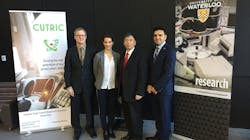CUTRIC to lead hydrogen fuel cell development project
The Canadian Urban Transit Research and Innovation Consortium (CUTRIC) will has partnered with the University of Waterloo, the University of Western Ontario, private industry and government to develop new hydrogen fuel cell technology for transit and automobile applications.
The CUTRIC will lead the project, dubbed The Development of Low-Cost, High Performing and Durable Polymer Electrolyte Membrane (PEM) Fuel Cells Project, as well as fund 25 percent of its cost. CUTRIC places the total cost of Phase I at C$1,898,432 (US$1,427,772.74). The Natural Sciences and Engineering Research Council of Canada (NSERC) will co-fund the project.
“This funding will integrate and develop zero-emission Hydrogen Fuel Cell technologies, advancing low and zero carbon solutions for urban mobility, one of CUTRIC’s key pillars,” said Josipa Petrunic, CUTRIC’s executive director and CEO.
CUTRIC's partners in the project include the University of Waterloo with Professor Xianguo Li as principal investigator; the University of Western Ontario; Ballard Power Systems Inc.; and StarPower ON Systems Inc.
“NSERC’s Research Partnerships support collaborations that allow new scientific evidence to be applied to a broad range of new applications,” stated Marc Fortin, vice-president, Research Partnerships, NSERC. “This research will play a key role in Canada’s commitment to tackling climate change and will allow Ballard Power Systems to maintain a leadership position in an increasingly competitive and important area of clean energy technology.”
“We at Ballard Power Systems are excited to be part of this Canadian funded project working with world class fuel cell researchers, Dr. Li, Dr. Sun and their teams at the University of Waterloo and Western University,” said Alan Young, principal research engineer at Ballard. “This project focuses on key areas required by the fuel cell industry and the new class of catalyst materials to be developed has significant promise to provide the technology needed to propel us forward to the next generation of fuel cell products.”
Xianguo Li, professor, mechanical engineering, University of Waterloo, says that in addition to developing fuel cell technology, the project will support the training for 14 graduate students, postdoctoral fellows, research associates and summer interns with skills that are in high demand.
CUTRIC explains that this project will develop world-class research in next generation fuel cell technologies for transit and automobile applications over the next four years.
"With vehicle emissions having the highest environmental impact and health hazard in cities, this study focuses on zero-emission fuel cell technology for urban transit vehicles that can be used in: hydrogen fuel-cell power/propulsion systems; battery electric power/propulsion systems with fuel cell as ranger extenders; and, electric power/propulsion systems with battery-fuel cell electric hybrids. The research focuses on PEM fuel cell technology and the technical challenges involving cost and durability under variable load operations," CUTRIC said in a press release about the project.
“The key outcome associated with the project is expected to be the development of low-cost, high performing, and durable fuel cells with a high power density capability,” says Petrunic. “This technology will form the basis for future generation cost-effective and durable PEM fuel cell technology that can be deployed for both automobile and transit applications.”
She added, “The adoption of fuel cell-powered transportation for vehicles, buses and trains in Ontario and across Canada, will contribute to meeting national and global climate change targets. In addition, this project will contribute to skilled job creation in the field of hydrogen mobility innovation and put Canada on the global map of hydrogen fuel cell technology. The governments of Ontario and Canada are working together with the project partners demonstrating leadership in technology innovation and ensuring a skilled workforce is ready for future opportunities.”

Mischa Wanek-Libman | Group Editorial Director
Mischa Wanek-Libman is director of communications with Transdev North America. She has more than 20 years of experience working in the transportation industry covering construction projects, engineering challenges, transit and rail operations and best practices.
Wanek-Libman has held top editorial positions at freight rail and public transportation business-to-business publications including as editor-in-chief and editorial director of Mass Transit from 2018-2024. She has been recognized for editorial excellence through her individual work, as well as for collaborative content.
She is an active member of the American Public Transportation Association's Marketing and Communications Committee and served 14 years as a Board Observer on the National Railroad Construction and Maintenance Association (NRC) Board of Directors.
She is a graduate of Drake University in Des Moines, Iowa, where she earned a Bachelor of Arts degree in Journalism and Mass Communication.




